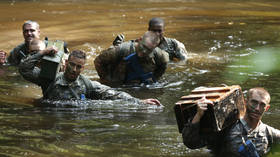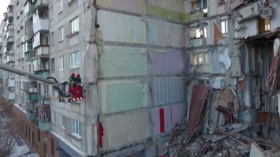Trump sent 80 US troops to Gabon over possible violence in DR Congo

Citing the possibility of violence in the Democratic Republic of the Congo, US president Donald Trump has deployed 80 troops with “appropriate equipment” and aircraft to the nearby Gabon, he informed Congress in a letter.
The first members of this US contingent arrived in Libreville, Gabon on January 2, Trump said in a letter sent to Congress on Friday. They are supposed to be “in position to support the security of United States citizens, personnel, and diplomatic facilities in Kinshasa.”
“Additional forces may deploy to Gabon, the Democratic Republic of the Congo, or the Republic of the Congo, if necessary for these purposes,” added the letter, which Trump said was in line with his obligations under the War Powers Resolution (Public Law 93-148).
New: Trump ordered 80 military personnel to Gabon to support US personnel, citizens, facilities in Democratic Republic of Congo in case of protests. US embassy ordered nonemergency personnel and families to depart in mid-Dec, after terror threats closed embassy for wk in Nov/Dec. pic.twitter.com/U9PZdBxshc
— Conor Finnegan (@cjf39) January 4, 2019
The troops will remain in the region until the security in the Democratic Republic of the Congo (DRC) “becomes such that their presence is no longer needed.”
Elections in the DRC took place on December 30, but the outcome has not yet been announced. The government of President Joseph Kabila, which is backing Emmanuel Ramazani Shadary to succeed him, says the elections were free and fair.
Opposition candidates Martin Fayulu and Felix Tshisekedi have accused the government of widespread irregularities, however. All sides claim to have won the vote, without citing any specific numbers.
On Friday, the Congolese electoral commission accused the Catholic Church’s conference of bishops (CENCO) of “preparing an insurrection,” Reuters reported. CENCO secretary-general Donatien Nshole had said on Thursday that church tallies showed a clear winner in the election, which was widely interpreted as a warning against manipulating the results.
Kabila’s government has cut off internet in the Congo, and shut down Radio France Internationale (RFI) and some local media outlets this week, saying it wanted to prevent the circulation of “fake” results.
Libreville is on the Atlantic coast of Gabon, which borders the Republic of the Congo (RC) to the east. That former French colony should not be confused with the DRC, which used to be ruled by Belgium. It was called Zaire under Mobutu Sese Seko, the US-backed strongman who ruled between 1960 and 1997, when he was ousted by rebels led by the current president’s father Laurent Desire-Kabila.
Like this story? Share it with a friend!















